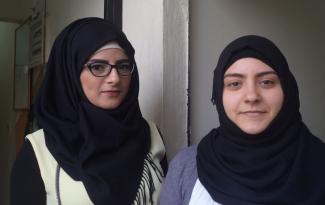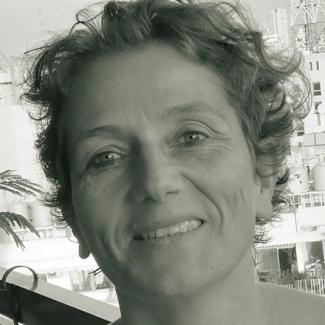Education
Hope and employment
 Naggar
Isra and Kholoud are two young Palestinian women who take part in a course run by Youth for Development.
Naggar
Isra and Kholoud are two young Palestinian women who take part in a course run by Youth for Development.
Isra, Hussain and Kholoud are participants in an accounting and office-management course. They and 33 other young Palestinians take classes in marketing, office management, typing et cetera in Arabic and English. The course goes on for ten months and is followed by an internship. It is run by an organisation called Youth for Development (YfD). The course is practice-orientated and aims to include graduates in the labour force.The three students hope that the YfD certificate will help them find a job. The chances are actually quite good. Around two-thirds of YfD graduates find employment.
YfD was started by a group of Palestinians with experience in the education sector in 2008. The idea was to carry on work previously done by Norwegian People’s Aid (NPA), a foreign NGO, which had begun offering professional training to Palestinians in Lebanon in the mid-1980s. It later transferred its programmes to local organisations.
Mohammad Kassem is the director of YfD and has been involved since the beginning. He says that the NGO provides socially and economically disadvantaged adolescents with an education. „We see ourselves as a quick intervention programme to help young people reach safe shores,“ he says. The NGO not only provides training, but it also helps youngsters look for a job and rehearses job interviews.
YfD stays in touch with its former students who are now working. The NGO thus has close ties to the job market and learns about job openings. Besides offering accounting and office-management courses, YfD trains adolescents who have attended school until the 9th grade in social work and secretarial work. Most courses are free of charge. They do not only tackle know-how and practical issues. YfD makes efforts to boost the self-esteem of youths and help them to develop their personalities.
Isra, Hussain and Kholoud are typical of many young Palestinians in Lebanon. Like many of his fellow trainees, for example, Hussain has dropped out of high school. He lives in Sabra, a poor district of south Beirut that is home to many Palestinians. The 20-year-old man explains why he quit school: „It’s impossible to tell whether going to school and making an effort will prove useful in the future. Many pupils think this way, so they do not see why they should finish school – and some have to start earning money at an early stage.“
Isra’s husband is another example. He left school in the 9th grade to contribute to supporting his family. Kholoud knows similar stories. „Even if both parents work, that does not mean that their children can afford to finish school,“ she says. Kholoud and Isra have had better luck than Hussain, however. Both have graduated from high school. Isra even studied interior design and graphic design. Nonetheless, she has not found work, despite searching for a long time. Kholoud – who is 21 years old – started studying business administration, but had to stop after one year because university tuition was too expensive.
The two young women are frustrated and resent Lebanese society. They do not get the same opportunities as Lebanese people, even though they have the same qualifications. Palestinians face discrimination when they look for work. Another complaint is that, when they do find employment, they are paid lower wages than Lebanese people.
Both women live in Borj Al-Barajneh, one of the three Palestinian camps in Beirut. Like their parents, they are descendants of the people who fled their homeland and found asylum in Lebanon after Israel was created and during the wars of 1948 and 1967. Many Palestinians still live in the camps that were established back then and have since developed into city districts – quite often slums.
The lack of civil rights
It is not easy for young Palestinians in Lebanon to look confidently to the future and find their place in Lebanese society. The financial crisis and high youth unemployment affect everyone in the country. Youth unemployment lies at approximately 35 % according to the International Labour Organisation (ILO). Making matters worse, the state still denies Palestinians many civil rights.
State-run schools exclude Palestinian children. The state university treats them as foreigners, subjecting them to a quota. Many kinds of jobs – especially high-skill professions – are off-limits to Palestinians. Palestinians cannot acquire property and are mostly excluded from state-run social-protection programmes and the national health service. For decades, Lebanese governments have enforced these policies claiming to prevent “tawtin” – the permanent settlement of Palestinians in Lebanon. Such discrimination has resulted in poverty and downward mobility. In a 2012 study, the ILO found that half of Palestinians in Lebanon do not earn more than $ 333 per month.
Salem Dieb is the deputy director of the Department of Education of the UN Relief and Works Agency for Palestine Refugees in the Near East (UNRWA – see sidebar: backgropund information). In his experience, the difficult social and economic conditions inevitably have an impact on education: "The parents in the refugee camps say that they have to take their children out of school and send them to work in order to survive,” he reports. “Boys are sent to work. Girls are sent to work as well, and sometimes marry early.”
Dieb is convinced that vocational training, which boys and girls from the 9th grade onwards can take part in, is a way of breaking the vicious cycle of lacking education and poverty. It fits young Palestinians’ desire to contribute to supporting their families fast, he says. UNRWA runs two vocational training schools. One is in the north of Lebanon and the other in the south. Approximately 1,000 students attend the two schools.
Isra, Kholoud and Hussain are optimistic that they will have better job opportunities once they will have graduated from YfD. Should that not prove true, they may emigrate. "Abroad, you are judged by what you are able to do and what you have learned, and not by your Palestinian identification card, which closes many doors here," they think.
Mona Naggar is a journalist and lives in Beirut. mona.naggar@googlemail.com


